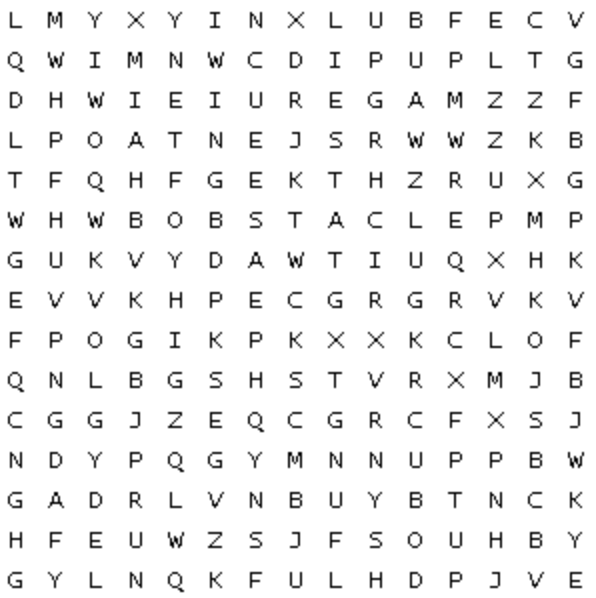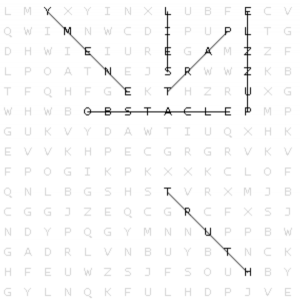Can you find the six title words in the puzzle above?
A book I finished last week provides insights I’d never considered before about how to view problems. In the novel The Nix, Nathan Hill tells the story of a woman and the son she abandoned in his youth. The mother is caught trying to assassinate a presidential candidate, and the son is recruited by her defense team. The setting bounces back and forth between the present and different times in their pasts, most particularly her involvement in the riots at the 1968 Democratic Convention.
Early in the book, Hill has one of his characters explain to the son that there are only four types of people: enemies, obstacles, puzzles, and traps. The key to being successful in your relationships, then, is to identify what type of person someone is and then to strategize accordingly – be on the defensive around enemies, aware of manipulations by traps, and so on. Later in the story, the son reflects back on that advice and while not disagreeing with it, determines that typing someone as an enemy, obstacle, or trap limits our judgment of them in a way that viewing them as puzzles doesn’t. Moreover, typing everyone as a puzzle doesn’t restrict one from being wary or defensive, when warranted.
I’d extend the four-fold characterization beyond people to nearly everything. For example, it’s easy to consider grading as an enemy, obstacle, or trap. But that limits my approach to getting it done and doing it timely and well. But thinking of that dreadful chore as a puzzle inclines me to experiment with different pedagogical and self-management practices. That’s a fine grained application, but the approach can also broaden our view of classroom and school policies, how we evaluate policy-makers and candidates, and how we form our opinions about outside issues.
Late in The Nix, the son is trying to fit his head around all that he is discovering about his mother and her past. He thinks about how the truth has been buried under so many lies. Then, he corrects himself and realizes that it’s not lies that bury the truth, but other truths. I don’t know about you, but I think that’s pretty deep. Take any issue, education-related or not, and see how honest you can be in admitting how much of what your adversaries say is true. I’ve been trying and the hardest part is filtering out my opponents’ contempt for my own views. But getting over my emotional attachment to my anger frees up a lot of thought space with which to improve my understanding of the issue. (Or at least a better understanding of how complex the issue is.)
Admitting the accuracies in your opponents’ claims can be done without compromising your own values or opinions. If anything, your views will either be confirmed in proportion to how well they account for the solid points you concede or your views will be improved and more comprehensive. One writer who does this particularly well is the extremely controversial conservative Kevin Williamson. He’ll often (but not always) write something like, “Our friends on the Left are not wrong when they say, ‘…’, but…” He also says he’s never lost a friend because of politics.
I finished listening to The Nix on the eve of the spring equinox while I was riding my bike through the desert toward the sunset. I like the poetry of that: Reading a book that is ultimately about balance, tempering judgements, and revising one’s attitudes on the most balanced night of the year. I hope I make good use of the added daylight this spring to work on some puzzles and some truths.
(Note: The audiobook version of the Nix last 21 hours and 42 minutes; the paperback is 640 pages. I listened to the audio version and at first thought Hill’s descriptions of events went way beyond what was necessary. I was about to quit it when I decided to listen to it at 1.5x speed. Usually, that just makes the narrator’s voice higher and silly. But with The Nix, his voice became better – more urgent and imperative and instead of walking away from the book, I ended up getting engrossed in Hill’s descriptions and enjoying the book immensely.)











Comments 1
Great piece! It allowed me to reflect on my teaching practices and pedagogical approaches in a new way. I think that mindset is so important and shifting your mindset can lead to more meaningful and relevant ways to approach things. I loved your example of thinking of grading as a trap vs. a puzzle.